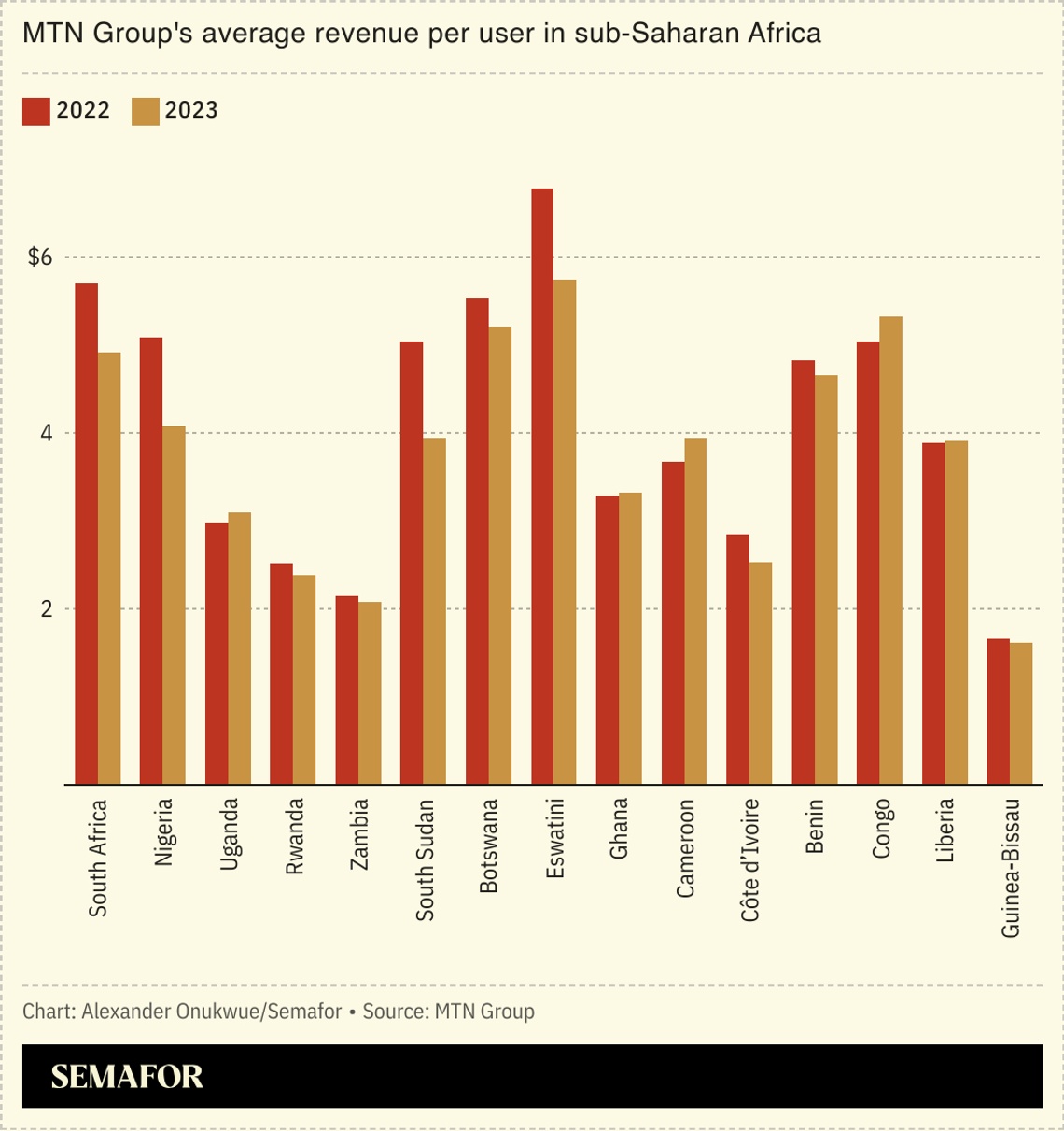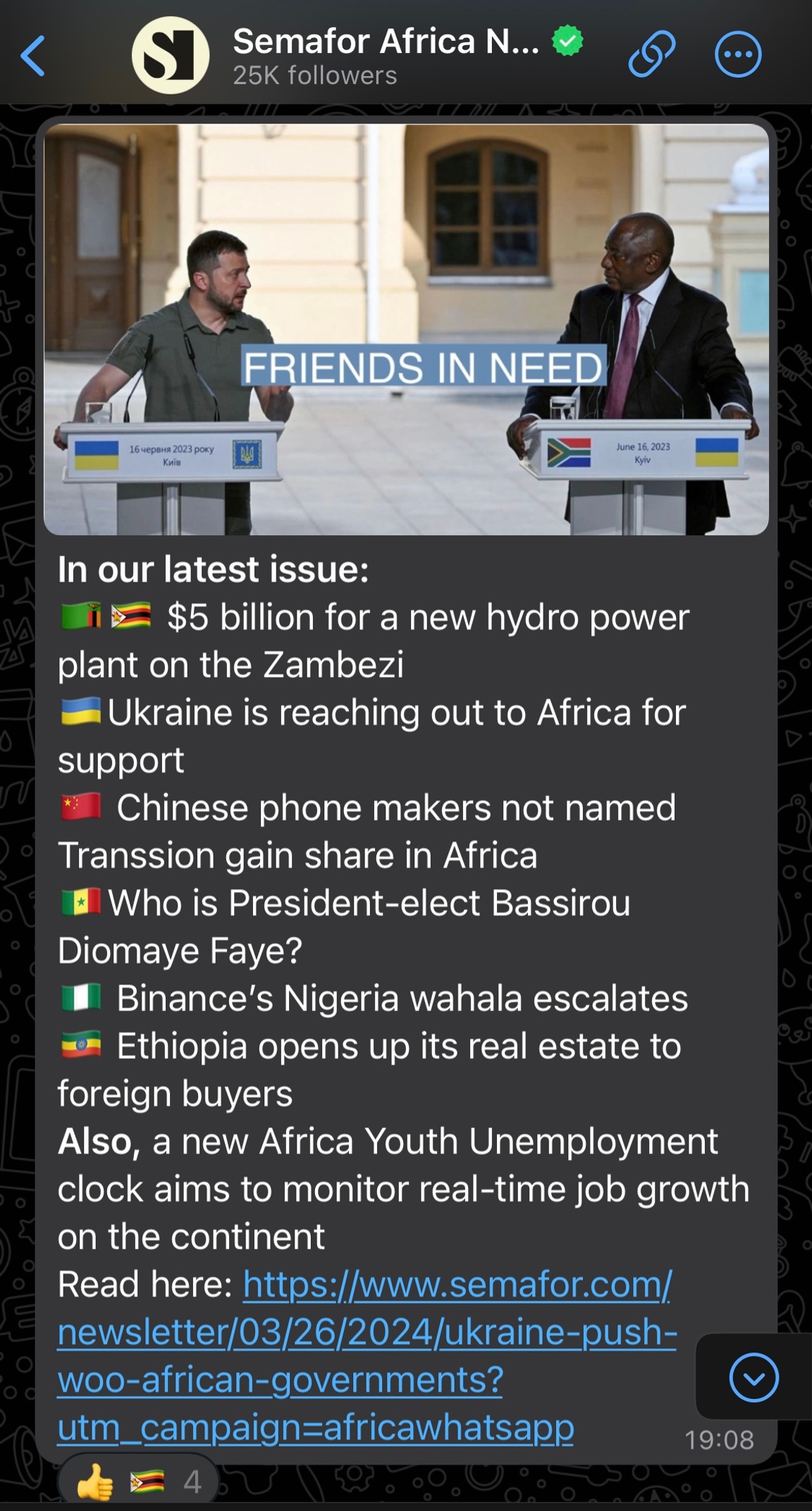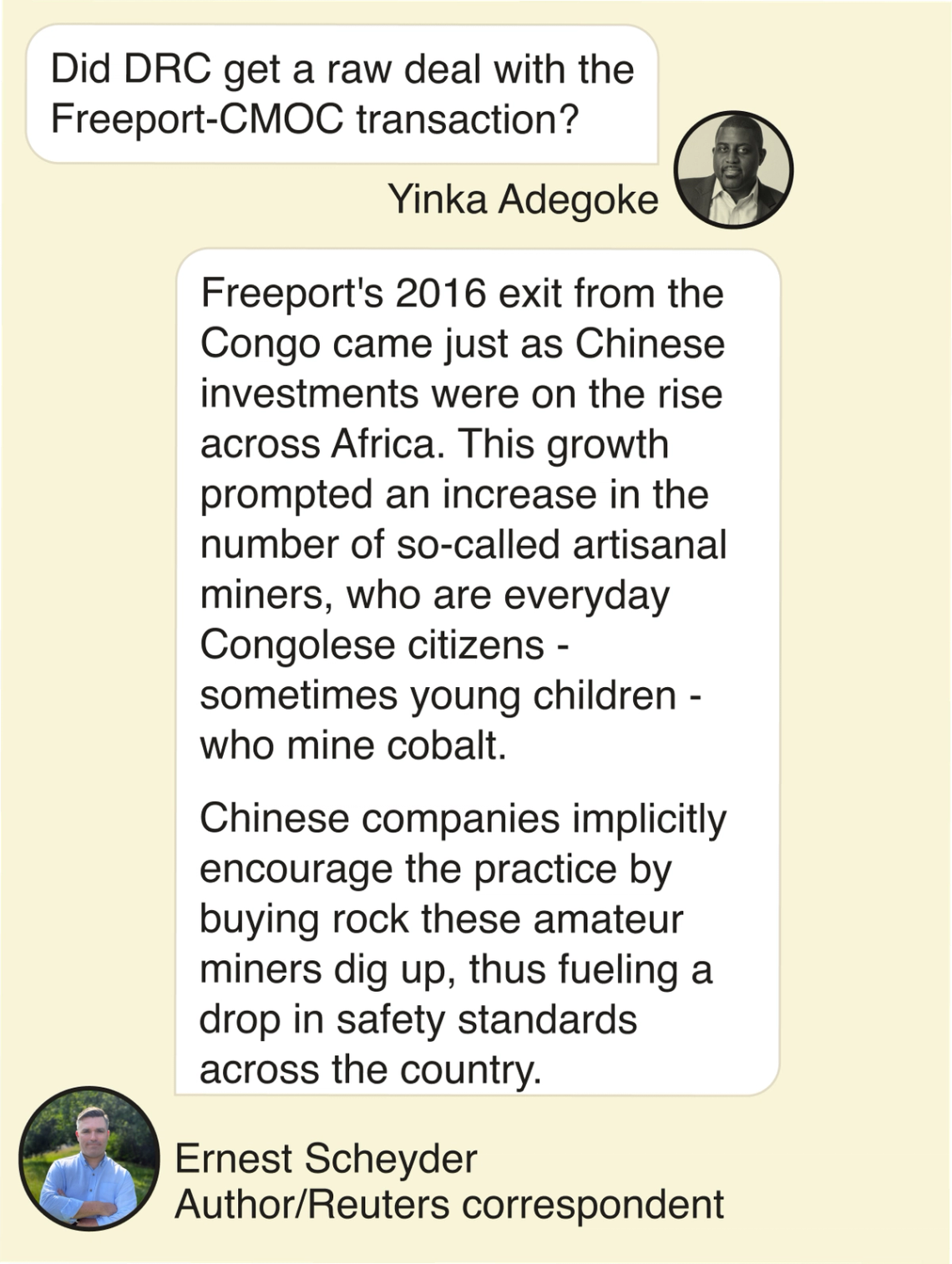| | Cocoa's price surge, MTN's revenues, Kenya Airways takes off, and Uganda's exercise push.͏ ͏ ͏ ͏ ͏ ͏ |
| |  | Africa |  |
| |
|
 | Alexis Akwagyiram |
|
Hello! Welcome to Semafor Africa, where we're on the lookout for "lawfare" in this year's many elections. Using a country's legal system to undermine political rivals is a standard part of the electoral playbook used by leaders who want to hold on to power. It's more subtle than physical intimidation, which can draw international criticism and even acclaim for your opponent. And courts should in theory be independent. That's why one of the most striking aspects of Bassirou Diomaye Faye's election victory in Senegal is that it came after the country's constitutional court rejected efforts by the outgoing president to delay the election for long enough to stymie his support. There was also an interesting legal decision this week in South Africa, where the electoral court ruled against the governing ANC on an issue that's likely to cost the ruling party votes. The ANC lost its bid to have former president Jacob Zuma's uMkhonto we Sizwe party barred from the country's May 29 general elections. Zuma is widely expected to eat into ANC's support base, particularly in his home province of KwaZulu-Natal. It was a busy week in South African politics: The leader of the main opposition party, the Democratic Alliance, refused to rule out entering a coalition government with the ANC if the latter failed to secure a 50% share of the vote for the first time since taking power after the end of apartheid. But, to me, the signal sent by the electoral court is more surprising and significant. It shows that the country's court system seems intent on staying out of political skirmishes, and is leaving it to the electorate to make their choices. 🟡 Follow us on social media here and now on WhatsApp too (more details below). And if this email was forwarded to you, sign up here to get it in your inbox too. |  A new record price for one tonne of cocoa on the international market, reached for the first time on Tuesday. Cocoa prices have risen remarkably in recent months, doubling since the beginning of the year, the International Cocoa Organisation (ICCO) said. Poor harvests in West African countries where the crop is most common have been blamed on adverse El Niño weather conditions. The price per tonne cooled to $9,624 at the end of trading on Tuesday, but the new high illustrates the challenges being faced by chocolate makers ahead of the Easter holiday season. The ICCO expects cocoa production to fall by nearly 11% this year. |
Gambia could scrap its landmark ban on female genital mutilation |
 Muhamadou Bittaye/AFP via Getty Images Muhamadou Bittaye/AFP via Getty ImagesBANJUL, The Gambia — The Gambia is on the brink of becoming the first nation in the world to reverse a ban on female genital mutilation (FGM). The practice, which has roots in social and religious beliefs, is widely viewed as a human rights violation and in many cases leads to severe health problems. The West African country passed a law banning the custom in 2015, but its parliament is now moving to overturn the ban. Lawmakers have argued that the move is necessary to "uphold religious loyalty and safeguard cultural norms and values." A bill to repeal the FGM ban passed its second reading last week. Of the 53 predominantly male members of the National Assembly, only four voted against the bill, with one abstaining. Only one out of the five women in the assembly voted against the repeal of the ban. The bill will now be reviewed by a parliamentary committee before a final vote. A date has not yet been set for the committee's review. FGM has been a deeply entrenched cultural practice in The Gambia for generations, and involves the partial or total removal of the clitoris. Pro-FGM campaigners often argue that they view FGM as a traditional rite of passage that symbolizes femininity and cultural identity. The 2015 ban was put in place during the autocratic 22-year tenure of former President Yahya Jammeh, who opposed the practice. Activists and civil society groups have spoken out in recent weeks, staging large protests at the national assembly building during both readings of the bill. The possibility that the current ban may be revoked is likely to cause a wave of even bigger demonstrations led by women. |
|
|  MTN Group reported 221 billion rand ($11.7 billion) in revenue for the 2023 financial year, a 6.8% increase on 2022. But after-tax profit sank 83.2%. The South Africa-based telecommunications company operates in 16 countries in sub-Saharan Africa. It saw its average revenue per customer fall in major markets including South Africa, Nigeria, Côte d'Ivoire, and Botswana. The company cited currency devaluation in Nigeria and "hyperinflation" in Ghana as headwinds that impacted its performance. In its fintech division, transaction volume increased 32% while transaction value increased 47% to $272 billion. Fintech contributed 21.8% to the company's service revenue in 2023, compared to just 3.3% for voice and 23% for data services. |
 We've soft launched our WhatsApp channel and hope you can join us on the platform where much of modern Africa lives. Follow two simple steps: One, click here to join. Two, and this is important, click on the 🔔 icon in the top right corner of your screen to unmute notifications. We'd love to hear from readers on what you'd like to see on WhatsApp that'd be better or different from our newsletters. Also, if you have that friend who never checks their inbox, this is for them. |
|
Alcohol startup escalates feud with Diageo subsidiary EABL |
 Simon Maina/AFP via Getty Images Simon Maina/AFP via Getty ImagesNairobi-based alcohol startup African Originals has doubled down on its claims that it was the victim of an alleged dirty tricks campaign waged by Diageo subsidiary East African Breweries Limited (EABL). It comes after EABL this week demanded that the startup retract its claims, which it said were false, defamatory, and baseless. "Our commitment to ethical business practices and fair competition remains unwavering and is enshrined in our clear internal policies about how we engage our partners - including influencers, who must follow and/or be in line with any local laws," EABL said in a statement. African Originals chairman Henry Rudd responded to Diageo, EABL's parent company, in a new letter dated March 25 that was viewed by Semafor Africa. "Rest assured that AO stands by every one of the allegations in my letter," Rudd wrote. "The most appropriate response to our concerns, I suggest, is your response to my letter rather than a press release." Last week, Semafor Africa exclusively reported on the allegations leveled against EABL by African Originals last month. In a previous letter dated February 19, African Originals accused EABL of copying its products, and incentivizing supermarket staff to malign and not display its products. EABL has said it is prepared to take "all necessary steps" to protect itself and its reputation, potentially setting the stage for a court battle with African Originals. — Martin K.N Siele in Nairobi |
|
|  Mohamed Nureldin Abdallah/Reuters/File Photo Mohamed Nureldin Abdallah/Reuters/File PhotoThe United States has said it hopes peace talks between Sudan's warring parties can resume in mid-April as Washington seeks an end to a conflict that has displaced millions and sparked what the United Nations has called "the world's largest hunger crisis." On Tuesday, the U.S. Special Envoy for Sudan Tom Perriello said "a number of factors have changed on the ground that make this moment more promising for resolution," but emphasized that the chance of a breakthrough was no higher than 50%. Perriello said the U.S. plans to hold talks in Saudi Arabia in mid-April. But it is unclear if the Sudanese Armed Forces and the paramilitary Rapid Support Forces would agree to negotiate. On Sunday, a top army general said they would not negotiate with the RSF. Not everyone is convinced about the U.S.'s mid-April timeline. "It's a classic diplomatic technique to impose artificial deadlines in order to create a sense of urgency and momentum," wrote Cameron Hudson, an Africa analyst at Washington-based think tank CSIS, in a post on social media site X. "But it can backfire; especially when facts on the ground don't support the deadline. Feels like the war is heating up, not cooling down." The war in Sudan, which started almost a year ago, has forced more than 8 million people from their homes. U.N. officials have warned that the situation may rapidly deteriorate as Sudan's "lean season" approaches in May, when food supplies from the last harvest start to run low. |
|  Nicolas Economou/NurPhoto via Getty Images Nicolas Economou/NurPhoto via Getty Images🇰🇪 Kenya Airways recorded an operating profit of 10.5 billion Kenyan shillings ($80.4 million) last year, the airline said on Tuesday. It marks 287% growth over 2022 and ends an era of losses at the carrier. The profit, driven by a rise in passenger numbers, was the airline's first since 2017. 🇳🇬 Nigeria's central bank on Tuesday hiked its key interest rate by 200 basis points, the second raise in as many months. The move comes as policymakers look to curb inflation and stem a currency crisis that has seen the naira plunge 70% against the U.S. dollar. 🇹🇿 🇧🇮 Tanzania and Burundi have started formal talks on the construction of a standard gauge railway link. The project, which is estimated to cost approximately $3.93 billion, follows an agreement between Tanzania and the African Development Bank for $91.76 million last month. 🇹🇬 Lawmakers in Togo adopted a new constitution on Monday, switching to a parliamentary system. The parliament now has the power to elect a president to a six-year term, which could allow President Faure Gnassingbe to extend his 19-year rule. 🇪🇹 The Commercial Bank of Ethiopia said it has recouped nearly 80% of the cash it lost during a system error that allowed customers to take out more money than they had in their accounts. Nearly 15,000 people have voluntarily returned funds that were "taken illegally," it said in a statement, adding that roughly $14 million was withdrawn during the glitch. |
| Ernest Scheyder is author of "The War Below: Lithium, Copper, and the Global Battle to Power Our Lives." His book covers the game-changing 2016 deal when Chinese mining firm CMOC bought DR Congo's Tenke Fungurume copper-cobalt mine from U.S. mining company Freeport.  |
|  Minasse Wondimu Hailu/Anadolu Agency via Getty Images Minasse Wondimu Hailu/Anadolu Agency via Getty ImagesUganda's government has ordered the provision of weekly exercise sessions for all civil servants. It said, in a post on X (formerly Twitter), that the move was to "tame the rising burden of lifestyle diseases" in the country. Uganda has seen a surge in noncommunicable diseases in recent years. A national health survey in 2022 revealed obesity rates in Uganda had risen from 17% to 26% over the past 17 years. The nation's health ministry said it had already been running exercise sessions for its staff, and urged other departments to follow suit. In 2018, Uganda introduced a national day for physical activity to encourage exercise and sports. |
|  If you're enjoying the Semafor Africa newsletter and finding it useful, please share with your family, friends, cocoa traders, and energetic Ugandan civil servants. We'd love to have them aboard too. Let's make sure this email doesn't end up in your junk folder by adding africa@semafor.com to your contacts. In Gmail you should drag this newsletter over to your 'Primary' tab. You can reply to this email and send us your news tips, gossip, and good vibes. — Yinka, Alexis, Alexander Onukwue, Martin Siele, and Muchira Gachenge |
| |
















No comments:
Post a Comment